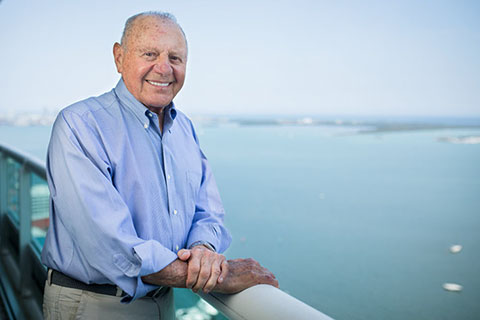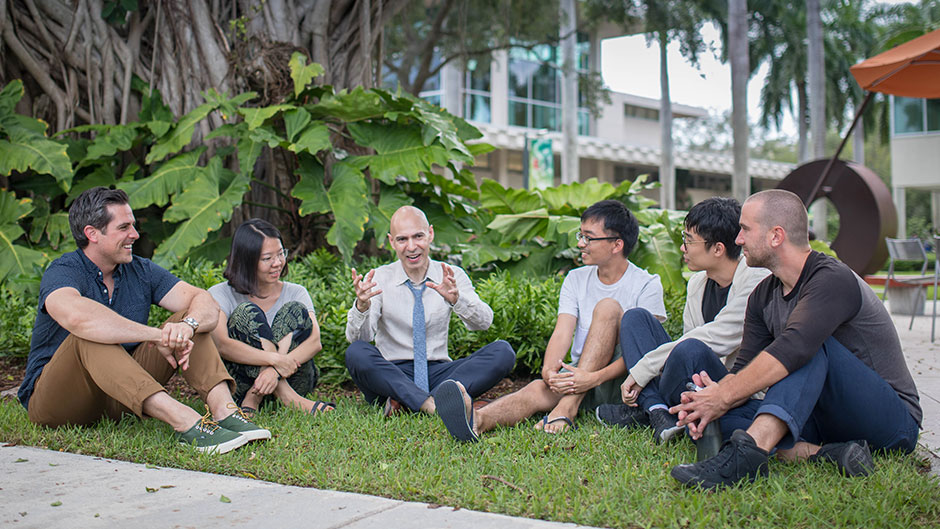As a child, Anjan Chakravartty visited India and the Caribbean, and could not help but notice the variations in culture and beliefs. He marveled at the intersection of religions and ideologies in his parents’ native Indian region of Assam when he visited relatives. Later in life, he continued to think about cultural differences in his native Canada, and in England, where he completed his doctoral degree.
Throughout these experiences, Chakravartty said he was always interested in why people believe in things so fervently, particularly with regards to religion and values.
“It’s hard not to be curious about why you get these huge divergences in beliefs about what exists, and how we should live, and what gives meaning to life,” said Chakravartty, professor of philosophy in the University of Miami's College of Arts and Sciences. “There are so many facts about which people will agree, and then in other areas there are deeply entrenched divisions, and I find that fascinating.”
Chakravartty has spent years delving into the topic of why people accept certain scientific theories as a professor specializing in the philosophy of science. He has also written two books and many journal articles on the topic.
But in a new role at UM, Chakravartty has started to probe into other realms of philosophy — namely, why people who do not believe in religion choose to do so, and how secular thinkers make sense of eternal questions like why humans exist and what is our purpose in the world. With secularism on the rise in America, particularly among youth, Chakravartty’s interest in the topic helped UM select him as the nation’s first Appignani Foundation Chair for the Study of Atheism, Humanism, and Secular Ethics.

“This chair has gotten quite a bit of notoriety because it’s unique,” said Louis J. Appignani, a former entrepreneur who donated $2.2 million to UM to create the chair. “There has never been an academic position to study atheism, humanism, and secular ethics. This is the first one.”
Chakravartty will formally be presented the chair at an event Feb. 6 in the Newman Alumni Center, and at the same time, UM will also be awarded the 2019 American Humanist Association’s University Award for Philosophical Diversity. The award is given to post-secondary institutions that “foster a culture of openness and academic inquiry that allows humanism and a diverse array of other philosophical perspectives to flourish,” said Brody Armstrong, program coordinator for the organization.
UM College of Arts and Sciences Dean Leonidas G. Bachas is thrilled that the University was able to entice Chakravartty from the University of Notre Dame, where he taught philosophy and directed the John J. Reilly Center for Science, Technology and Values. Hurricanes were able to take the scholar’s first class, Science and Humanism, last semester in the philosophy department.
“The University of Miami fosters a culture of academic learning without boundaries, and this is evident with the appointment of the [chair],” Bachas said. “Mr. Appignani’s gift allows students to explore and investigate the study of atheism within a philosophical context. It also enhances the learning experience and promotes President Julio Frenk’s initiative to establish more endowed chairs at UM for the sheer promotion of academic and learning advancement for all students.”
Appignani said he looks forward to seeing Chakravartty engage UM students and the larger South Florida community in a dialogue about secularism. A main goal of the chair is to expand knowledge about atheism, humanism, and secularism, and their roles throughout history, Appignani said. To that end, Chakravartty will be organizing lectures with experts in the field, piloting research on these topics, and speaking at events. For example, he is hosting the International Humanist and Ethical Union’s board meeting on campus in mid-February. And in October, Chakravartty invited philosophy professor Michael Ruse from Florida State University who gave a lecture at UM titled “On being a full and worthwhile human being: Can life be meaningful without God?”
“Not everyone believes there is someone up in the sky, so it’s an important thing to study and think about secular thinking,” Appignani said. “I want people to realize it’s okay if they don’t believe in the mythology of god.”
So what exactly is humanism? The American Humanist Association and Chakravartty describe it as a perspective that emphasizes science and reason to understand our world, as an alternative to religious thought. It also stresses the idea of acting with dignity and compassion toward others.
“So if you put a bunch of humans in a room, they should cooperate because that’s the right thing to do, not because God is telling us to do that, but because we should be good to each other,” Chakravartty said.
Although a study of secularism will naturally include discussions about why people decide to believe in a divine being or not, Chakravartty said that he would like to take these debates a step further at UM.
“Let’s start with the assumption of atheism or agnosticism, then what?” Chakravartty said. “If you’re not religious, how do you answer questions about the meaning of life? How do we think about the value of life if we are not thinking about it in religious terms, but in humanistic terms? That’s what I want to explore.”

